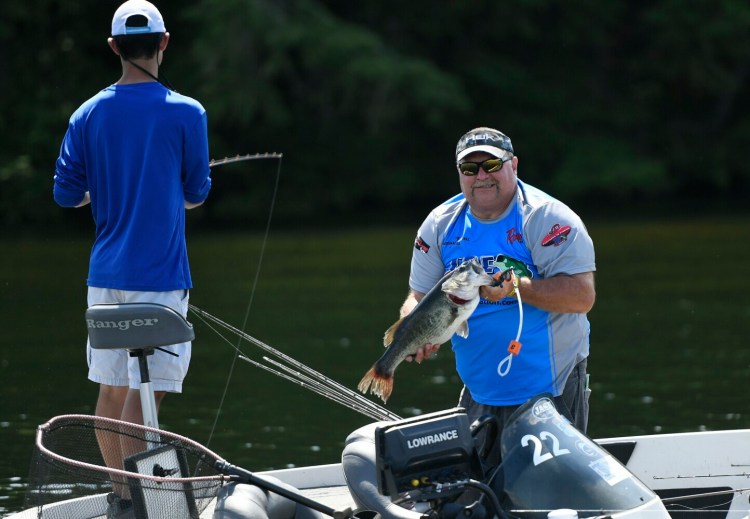CHINA — Maine’s native brook trout is famously sought out by fishermen from around the world. The state legislature has dubbed it Maine’s “heritage fish.” It’s the most popular wild game fish species in Vacationland, according to state surveys.
But the species that runs a close second? It’s non-native bass.
It may be from away, but that hasn’t dampened the love. In fact, Maine’s bass fishermen are shocked to learn the black bass is not No. 1. (Largemouth and smallmouth bass arrived in Maine in the mid-19th century when bass were introduced for sport fishing.)
Consider: Maine is home to more than 300 bass fishing tournaments and around 50 bass fishing clubs, and on any given summer weekend, the state becomes the playground for many other casual fishermen targeting the species.
“I think if they took a statewide poll, it would be bass,” said Roger Laflamme, president of Mainely Bass, one of the state’s bass fishing clubs. “I’ve fished a lot of lakes over the course of the years, and there are a lot of bass boats.”
Feel the love

Bass boats line the shore on China Lake during the bass tournament. Shawn Patrick Ouellette/Staff Photographer
At the state’s fifth-largest bass fishing tournament, held last weekend on China Lake with some 120 participants, fishermen explained the fish’s appeal.
For starters, they say, you can catch bass in the heat of summer when the trout fishing slows down. Also, no matter when you hook them, bass are feisty and pugnacious, qualities fishermen prize. Factor in the relative ease with which an angler can find a solitary spot to bass fish on Maine’s more than 500 bass waters, and it’s easy to understand why bass fishing is popular here. Many fish for the thrill of catching bass, not for a fresh meal, and practice catch and release.
“I guided a fisherman who came from the Ukraine to fish for bass in Maine. He said a 2.5-pound bass here fought harder than a 12-pound bass in Florida. In Maine, they’re just mean and strong,” said Registered Maine Guide Louis Deering.
Bass can be found in every county in the state, although most bass waters are along the coast in southern, central and Down East Maine.

Teammates Gavin Sperlich of Old Orchard Beach, left, and Dwayne Turnage fish together during the tournament. Bass are popular, in part, because they put up a good fight. Shawn Patrick Ouellette/Staff Photographer
While you’d expect bass clubs to praise Maine’s freshwater bass, the fish’s popularity here isn’t merely anecdotal. It’s backed up by data.
According to a 2016 Maine Department of Inland Fisheries and Wildlife survey of freshwater anglers, 48 percent frequently fish for the non-native bass, while 58 percent said they often fished for trout. (The 2016 survey is the state’s most recent.)
The state’s landlocked salmon came in a distant third, with just 22 percent saying they often targeted this native fish. This, though salmon derives its Latin name (Salmo sebago) from Sebago Lake, one of the fish’s original four watersheds.
The survey also showed that 45 percent of non-resident fishermen in Maine pursue bass, while only 37 percent favor trout.
Statewide data aside, Jason Seiders, the Sydney-based bass species specialist for IFW, thinks bass are the runaway favorite in southern and central Maine. While many other states also boast bass fisheries, what sets Maine apart, he said, is the minimal fishing pressure here.
“We like to to keep it a secret,” agreed Laflamme. “When you go down to Texas, Louisiana, Alabama, you wouldn’t believe the bass boats that are everywhere – hundreds of thousands.”
North versus South
In many states to the south, bass waters are overrun with fishermen. Fishing for bass is a very different experience outside Maine, fishermen and biologists say. Travel even just a few hours down Interstate 95, and you’ll find bass fishermen clustered on any given pond.
“In southern New England, there are fewer waters, and those waters are pounded by anglers,” Seiders said. “We have such diverse resources in Maine. We have a ton of water and endless possibilities. You can fish for largemouth bass in really small ponds in a canoe or on a great pond and not see another fishermen. The southern states don’t have that.”
One thing the South does have, though, is bigger bass. Their longer summer and fall seasons translate into a longer “growing season,” months when the fish are on the move and feeding. In the South, a largemouth bass can grow to more than 15 pounds during its 20-year lifespan. But Maine’s long winters mean the fish here typically grow to just 1 to 3 pounds, with some reaching 8 pounds, according to IFW.
Still, Mark Lodge of Waterboro believes more people are fishing for bass in Maine than ever before.
“Since I was as teenager, it’s evolved,” Lodge said. “And the quality of the bass fishing has improved. And I’ve fished in … Tennessee, Maryland, Alabama and Texas. It’s harder to fish for (big) bass down there. You don’t get as many bites.”
Bass rule
The story from many Maine bass fishermen at the China Lake tournament was the same: They started trout fishing as kids, discovered bass fishing, and were won over by the excitement of fighting a fish you can catch all summer long.

Herb Meyer, left, and Roger Laflamme, both of Lyman, pose with some of their catch after the tournament. Shawn Patrick Ouellette/Staff Photographer
Dwayne Turnage of Hollis, who has fished for bass for 30 years, caught the biggest fish of the day – a 6.61-pound largemouth. A half dozen others in the tournament also caught largemouth over 5 pounds.
These days when he’s out on Maine’s lakes and ponds, Turnage believes three-quarters of the fishermen he sees are fishing for bass. Maine, he said, is fast becoming known as a bass-fishing destination.
“You won’t get bigger fish in Maine,” he said, “but we’ve got more quality fish.”
Send questions/comments to the editors.



